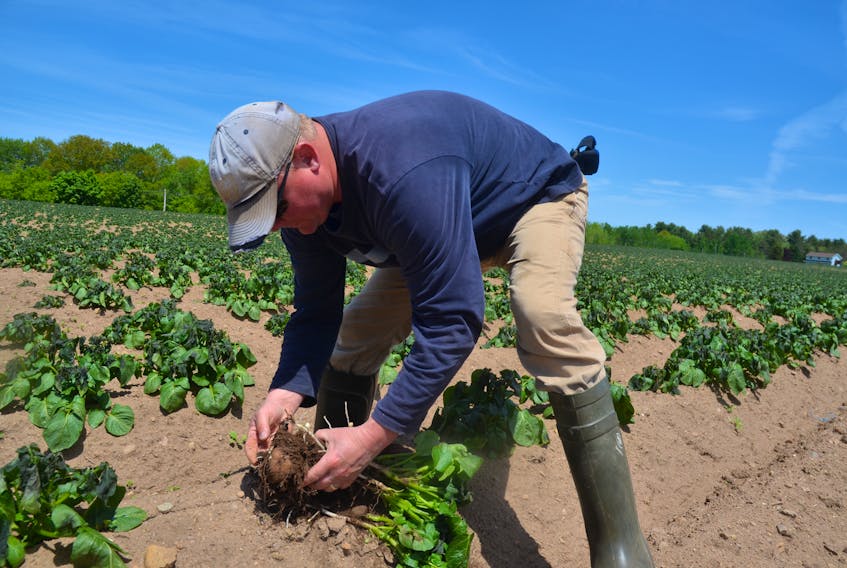BERWICK, NS - When it comes to the impact on crop yield and the financial loss involved, only time will tell.
A heavy frost overnight from June 3 to 4 has taken its toll on some crops in the Valley. Morse’s Farm Limited owner and operator Anthony Morse said he is waiting to see how well his early potato crop bounces back after the plants, which had been flourishing, incurring significant damage.
Examining his fields on June 4, Morse said he estimates that the so-called hard frost killed 20 to 25 per cent of the leaves on plants in one location and as much as 50 per cent in a field at a slightly lower elevation. He has approximately 50 acres of early potatoes planted.
Morse said it was the severity and duration of the freeze, which lasted several hours, that compromised the cell structure of such a large percentage of the leaves on his potato plants. He said he’s never seen potato plants so far along damaged so severely by frost at this time of year. The crop had been off to one of the best starts he’s ever seen.
Luckily, the underlying portion of the plants still appear healthy. Morse said only time would tell how badly the frost would impact his operation in terms of yield and monetary loss.
“My fear right now is that they took a serious hit,” Morse said. “Either they’re going to come out of it or they’re not.”
He isn’t concerned with his strawberry crop because they have an extensive irrigation system with laterals and sprinklers that they run to protect the plants. Water from the sprinklers forms layers of ice over the plants, blossoms and developing fruit, insulating them from cold and frost damage.
He has a thermometer that is only a few inches off the ground at a low point in the corner of a strawberry field that indicated late on June 3 that it was time to take action to protect the crop.
“I started the pumps at 11 o’clock last night (June 3) because it had already gotten down to almost freezing at field level,” Morse said.
He ran his pumps until approximately 9 a.m. on June 4, when the threat of damage had passed. Morse estimates that they could have lost up to three-quarters of the strawberry crop if it hadn’t been for the frost protection.
Unfortunately, they don’t have an irrigation system set up in the potato fields. Morse spent most of the night out in the fields and noticed that the plants were sagging heavily. Normally, even on a cool night, the plants are perky. Morse suspects that other potato crops in the Valley were likely impacted in a similar manner.
“My father, who is 95, said to me that the latest frost he ever saw was the 10th of June,” Morse said. “This was years and years ago, either in the forties or the fifties.”
Morse said that perhaps the worst-case scenario would be incurring another heavy frost within a few days.
‘Deep, severe frost’
Greg Webster, owner of Webster Farms in Cambridge, described it as “a deep, severe frost” that was more like one you would see in the fall. He said anyone without frost protection on fruit crops would have incurred damage, perhaps severe damage, from the frost.
He said they ran protection with their irrigation system on their strawberry crop all night from June 3 to 4 and he thinks the fruit is going to be alright. They had the water on early enough and long enough to do the job. It was the tenth night this spring that they’ve run frost protection and there may be a couple more yet.
“We probably had half an inch of ice on the strawberry field last night,” Webster said on June 4.
He said their raspberries weren’t far enough along to be at serious risk, although they do have a first-year field that was further along than the others. Webster said time would tell if the frost had an impact.
“It’s too early to tell because they haven’t bloomed yet but the fruit trusses are stretched and there are buds swelling but nothing opened,” Webster said.
He said they don’t dare frost protect the raspberries because the fruit trusses are so tender that they would break off.
Webster said it’s too early to tell if their rhubarb crop has been negatively impacted. They weren’t planning on harvesting it this year but do plan to use it as root stock.
He said a little freezing of the leaves doesn’t seem to hurt it too much. However, if it gets cold enough to freeze the water inside the stalk, it seems to take the plant a day or so after it thaws out to realize it’s not getting any energy from the leaf and it starts to collapse.
Webster said their dry beans were just being planted and aren’t up yet so they should be fine. He is hearing reports from other farmers that soy bean crops have incurred significant damages.
“I’m guessing there could even be a little damage in the tree fruit industry,” Webster said. “I only know of one or two producers that have any sort of frost protection for apples.”
Webster said the temperature at his weather station, which is about five feet off the ground in his farm yard, fell to -2.5 C. He suspects temperatures at ground level in the fields, if they hadn’t watered, would have probably been in the vicinity of -8C.
“We’ve come through it as good as anybody could I think but I know there’s going to be some farms that have lost a significant chunk of their production,” he said.
Webster said having this heavy a frost this late in the season isn’t totally unexpected but it doesn’t happen very often, perhaps once in a decade. He said there wasn’t much frost last spring at all. They might have run frost protection three or four times.









